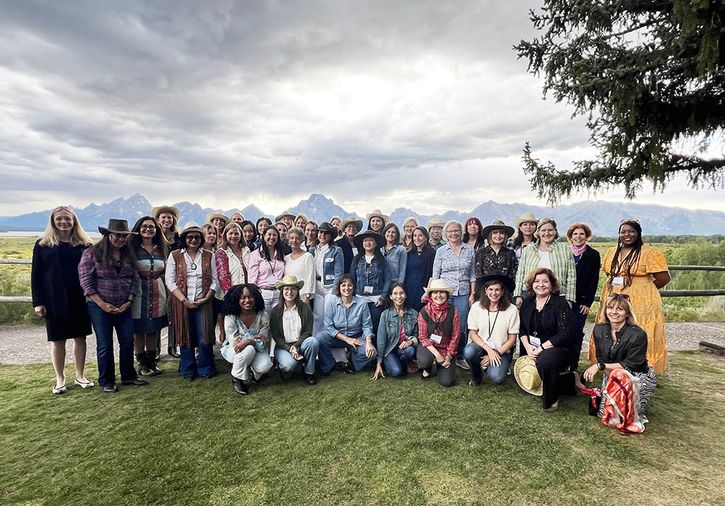The Federal Reserve Bank of Kansas City convened the 47th Economic Policy Symposium Aug. 22-24 at Jackson Hole, Wyoming, with 145 individuals from 36 countries participating.
Each year in late August the symposium brings together international central bankers, Federal Reserve officials, other policymakers and academics to discuss issues of mutual concern. The symposium is one of the longest-standing central banking conferences in the world. The 2024 event, under the theme "Reassessing the Effectiveness and Transmission of Monetary Policy,” explored lessons learned from monetary policy responses to the COVID-19 pandemic and the subsequent surge in inflation.
Some of the most forceful monetary policy actions on record have occurred during the 2020s. First, central banks worldwide adopted historically accommodative policy to offset the pandemic shock. Then, as inflation surged to multi-decade highs, monetary policymakers responded with one of the most rapid tightening cycles on record.
Although outcomes have varied across economies, inflation has eased even as growth has remained surprisingly resilient. The resilience of growth through this period has raised questions about the transmission of monetary policy and the lessons to be learned from this extraordinary episode.
Kansas City Fed’s president
The 2024 symposium was the second of Jeff Schmid’s tenure as president and CEO of the Federal Reserve Bank of Kansas City. Schmid joined the Bank in August 2023. At the 2024 symposium, he welcomed attendees at a dinner on the first evening. Earlier in Jackson Hole, in a media interview, he shared some of his views on the path forward for U.S. monetary policy.
"We've got some data sets to come in before September," Schmid said in an interview on Aug. 22 with CNBC in reference to the Fed's September policy meeting. "It bears looking harder at it, I'm going to let the data show where we lead...I would agree with several of my colleagues that you probably want to act maybe before (inflation) gets to two (percent) but that sustainability to two I think is really important."
Powell on rate cuts: 'The time has come'
Chair Jerome Powell was among many Federal Reserve leaders in Jackson Hole. In a widely watched speech on Aug. 23, Powell signaled that the central bank could soon adjust its monetary policy by cutting interest rates.
“Overall, the economy continues to grow at a solid pace,” Powell said. “But the inflation and labor market data show an evolving situation. The upside risks to inflation have diminished. And the downside risks to employment have increased. As we highlighted in our last FOMC (Federal Open Market Committee) statement, we are attentive to the risks to both sides of our dual mandate. The time has come for policy to adjust. The direction of travel is clear, and the timing and pace of rate cuts will depend on incoming data, the evolving outlook, and the balance of risks.”
Powell added: “We will do everything we can to support a strong labor market as we make further progress toward price stability. With an appropriate dialing back of policy restraint, there is good reason to think that the economy will get back to 2 percent inflation while maintaining a strong labor market.”
Read the External Linkfull transcript of Powell’s remarks and see a video of the speech in the External LinkBank's YouTube channel.

In a tradition started by former Kansas City Fed president Esther George, women participating in the symposium gathered for a "Women of Jackson Hole" picture.
About the symposium
Since 1978, the Federal Reserve Bank of Kansas City has sponsored a symposium on an important economic issue facing the U.S. and world economies. The goal of the symposium is to provide a vehicle for promoting public discussion and exchanging ideas. Beginning in 1982, the symposium has been hosted at the Jackson Lake Lodge at Grand Teton National Park in Wyoming—one of the seven states served by the Tenth Federal Reserve District. Throughout the event’s history in Jackson Hole, attendees from 70 countries have gathered to share their diverse perspectives and experiences.
As the regional headquarters of the nation’s central bank, the Kansas City Fed and its branch offices in Denver, Oklahoma City and Omaha serve the seven states of the Tenth District: Colorado, Kansas, Nebraska, Oklahoma, Wyoming, northern New Mexico and western Missouri.
See research papers, presentations and related material from the 2024 Economic Policy Symposium. Access the free book, “In Late August,” a history of the symposium.
The views expressed are those of the authors and do not necessarily reflect the positions of the Federal Reserve Bank of Kansas City or the Federal Reserve System.
